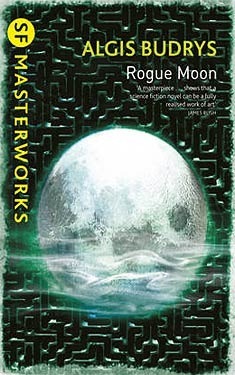What do you think?
Rate this book


175 pages, Paperback
First published January 1, 1960
"Perhaps it's the alien equivalent of a discarded tomato can. Does a beetle know why it can enter the can only from one end as it lies across the trail to the beetle's burrow? Does the beetle understand why it is harder to climb to the left or right, inside the can, than it is to follow a straight line? Would the beetle be a fool to assume the human race put the can there to torment it — or an egomaniac to believe the can was manufactured only to mystify it? It would be best for the beetle to study the can in terms of the can's logic, to the limit of the beetle's ability. In that way, at least, the beetle can proceed intelligently. It may even grasp some hint of the can's maker. Any other approach is either folly or madness."So a recommendation with some reservations then, a 3 stars rating seems about right.
'Please go on telling me about yourself,' she said.
'Do you want to know what it is with you and women?'
Hawks blinked at her. 'Yes. Very much.'
'You treat them like people.'
'I do?' He shook his head again. 'I don't think so.'
'I take up as much room in the world, the way you see it, as you do. Do you have any idea of how rare a thing that is?'
Hawks was puzzled. 'I'm glad you feel that way,' he said slowly, 'but I don't think that's true.'
'Cobey'll be very upset,' Hawks was saying, lost in thought. 'He'll have to pay the technicians bonus-time rates.'
'Who's Cobey?'
'A man, Elizabeth. Another man I know.'
'Women--' he said earnestly, 'women have always fascinated me. [...] there was something about women. I don't mean the physical thing. I mean some special thing about women: some purpose that I couldn't grasp. What bothered me was that here were these other intelligent organisms, in the same world with men, and there had to be a purpose for that intelligence. If all women were for was the continuance of the race, what did they need intelligence for? A simple set of instincts would have done just as well. And as a matter of fact, the instincts are there, so what was the intelligence for? There were plenty of men to take care of making the physical environment comfortable. That wasn't what women were for. At least, it wasn't what they had to have intelligence for ... But I never found out. I've always wondered.'
He opened the car door, half turned to step out, and then stopped. 'You know -- You know,' he began again, 'I do talk a lot, when we're together.' He looked at her apologetically. 'You must get awfully bored with it.'
'I don't mind.'
He shook his head. 'I can't understand you.' He smiled gently.
'Would you like to?'
He blinked. 'Yes. Very much.'
'Maybe I feel the same way about you?'
He blinked again. 'Well,' he said. 'Well. I've been sort of assuming that all along, haven't I? I never thought of that. I never did.' He shook his head.
'My God, Ed, what's happened to me? What am I doing to both of us? All I ever wanted to do was help you, and somehow it's come out like this. I never should have come here today, Ed. I shouldn't have done this last thing to you.'